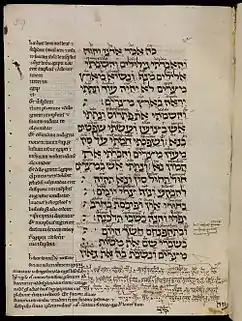Ezekiel 24
Ezekiel 24 is the twenty-fourth chapter of the Book of Ezekiel in the Hebrew Bible or the Old Testament of the Christian Bible. This book is attributed to the prophet/priest Ezekiel, and is one of the Books of the Prophets. This chapter contains Ezekiel's "last oracle against Jerusalem".[1]
| Ezekiel 24 | |
|---|---|
 Book of Ezekiel 30:13–18 in an English manuscript from the early 13th century, MS. Bodl. Or. 62, fol. 59a. A Latin translation appears in the margins with further interlineations above the Hebrew. | |
| Book | Book of Ezekiel |
| Hebrew Bible part | Nevi'im |
| Order in the Hebrew part | 7 |
| Category | Latter Prophets |
| Christian Bible part | Old Testament |
| Order in the Christian part | 26 |
Text
The original text of this chapter was written in the Hebrew language. This chapter is divided into 27 verses.
Textual witnesses
In the Hebrew Masoretic tradition, some early manuscripts which contain the text of this chapter are the Codex Cairensis, Aleppo Codex (10th century), and Leningrad Codex (1008-1009).[2] Fragments containing parts of this chapter were found among the Dead Sea Scrolls, that is, 4Q75 (4QEzekc; 100–50 BCE) with extant verses 2–3.[3][4][5][6]
There is also a translation into Koine Greek known as the Septuagint, made in the last few centuries BC. Extant ancient manuscripts of the Septuagint version include Codex Vaticanus (B; B; 4th century), Codex Alexandrinus (A; A; 5th century) and Codex Marchalianus (Q; Q; 6th century).[7][lower-alpha 1] There are a number of places in this chapter where the Septuagint text lacks wording present in the Hebrew texts.[1]
Verse 1
- Again, in the ninth year, in the tenth month, on the tenth day of the month,
Cross reference: 2 Kings 25:1–3; Jeremiah 39:1–2; Jeremiah 52:1–6
- "The tenth month" (of the ecclesiastical year on the Hebrew calendar): Tevet. The date corresponds to January 5, 587 BCE, based on the analysis by theologian Bernhard Lang,[10] or 588 BCE, in the New Oxford Annotated Bible.[11]
Verse 2
- "Son of man, write thee the name of the day, even of this same day:
- "Son of man" (Hebrew: בן־אדם ḇen-'ā-ḏām): this phrase is used 93 times to address Ezekiel.[13]
- "Set" (Hebrew: סָמַ֤ךְ sā-maḵ): translated "started his siege" (NKJV); "has laid siege" (NIV); "drew close" (ASV). The Hebrew verb means "lean", "lay", "rest", "support", in the sense of "to place or lay something upon any thing, so that it may rest upon, and be supported by it" or "to lay hand on any thing, so as to lean upon the hand."[14][15]
Verses 15-27
On the death of his wife, the prophet abstains from all mourning, providing "a sign of the silent stupefaction which the news of the city’s fall will occasion".[1]
See also
- Babylon
- Ezekiel
- Jerusalem
- Tevet
- Related Bible parts: 2 Kings 25, Jeremiah 39, Jeremiah 52, Ezekiel 11, 2 Corinthians 1
Notes
- Ezekiel is missing from the extant Codex Sinaiticus.[8]
References
- Davidson, A. B. (1893), Cambridge Bible for Schools and Colleges on Ezekiel 24, accessed 9 December 2019
- Würthwein 1995, pp. 35–37.
- Ulrich 2010, p. 589.
- Dead sea scrolls - Ezekiel
- Fitzmyer, Joseph A. (2008). A Guide to the Dead Sea Scrolls and Related Literature. Grand Rapids, MI: William B. Eerdmans Publishing Company. p. 38. ISBN 9780802862419. Retrieved February 15, 2019.
- 4Q75 at the Leon Levy Dead Sea Scrolls Digital Library
- Würthwein 1995, pp. 73–74.
- Shepherd, Michael (2018). A Commentary on the Book of the Twelve: The Minor Prophets. Kregel Exegetical Library. Kregel Academic. p. 13. ISBN 978-0825444593.
- Ezekiel 24:1
- Lang, Bernhard (1981) Ezechiel. Darmstadt. Wissenschaftliche Buchgesselschaft, cited in Kee et al 2008, p. 209.
- The New Oxford Annotated Bible with the Apocrypha, Augmented Third Edition, New Revised Standard Version, Indexed. Michael D. Coogan, Marc Brettler, Carol A. Newsom, Editors. Publisher: Oxford University Press, USA; 2007. p. 1213-1214 Hebrew Bible. ISBN 978-0195288810
- Ezekiel 24:2
- Bromiley 1995, p. 574.
- Brown, Briggs & Driver 1994 "סָמַ֤ךְ"
- Gesenius 1979 "סָמַ֤ךְ"
- Ezekiel 24:24
- Rashi's Commentary on Ezekiel 24:24.
Sources
- Bromiley, Geoffrey W. (1995). International Standard Bible Encyclopedia: vol. iv, Q-Z. Eerdmans. ISBN 9780802837844.
- Brown, Francis; Briggs, Charles A.; Driver, S. R. (1994). The Brown-Driver-Briggs Hebrew and English Lexicon (reprint ed.). Hendrickson Publishers. ISBN 978-1565632066.
- Clements, Ronald E (1996). Ezekiel. Westminster John Knox Press. ISBN 9780664252724.
- Gesenius, H. W. F. (1979). Gesenius' Hebrew and Chaldee Lexicon to the Old Testament Scriptures: Numerically Coded to Strong's Exhaustive Concordance, with an English Index. Translated by Tregelles, Samuel Prideaux (7th ed.). Baker Book House.
- Joyce, Paul M. (2009). Ezekiel: A Commentary. Continuum. ISBN 9780567483614.
- Kee, Howard Clark; Meyers, Eric M.; Rogerson, John; Levine, Amy-Jill; Saldarini, Anthony J. (2008). Chilton, Bruce (ed.). The Cambridge Companion to the Bible (2, revised ed.). Cambridge University Press. ISBN 9780521691406.
- Ulrich, Eugene, ed. (2010). The Biblical Qumran Scrolls: Transcriptions and Textual Variants. Brill.
- Würthwein, Ernst (1995). The Text of the Old Testament. Translated by Rhodes, Erroll F. Grand Rapids, MI: Wm. B. Eerdmans. ISBN 0-8028-0788-7. Retrieved January 26, 2019.